
Aug 14
1784 Russians settle Alaska:
On Kodiak Island, Grigory Shelikhov, a Russian fur trader, founds Three Saints Bay, the first permanent Russian settlement in Alaska.
The European discovery of Alaska came in 1741, when a Russian expedition led by Danish navigator Vitus Bering sighted the Alaskan mainland. Russian hunters were soon making incursions into Alaska, and the native Aleut population suffered greatly after being exposed to foreign diseases. The Three Saints Bay colony was founded on Kodiak Island in 1784, and Shelikhov lived there for two years with his wife and 200 men. From Three Saints Bay, the Alaskan mainland was explored, and other fur-trade centers were established. In 1786, Shelikhov returned to Russia and in 1790 dispatched Aleksandr Baranov to manage his affairs in Alaska.
Baranov established the Russian American Company and in 1799 was granted a monopoly over Alaska. Baranov extended the Russian trade far down the west coast of North America and in 1812, after several unsuccessful attempts, founded a settlement in Northern California near Bodega Bay. British and American trading vessels soon disputed Russia's claims to the northwest coast of America, and the Russians retreated north to the present southern border of Alaska. Russian interests in Alaska gradually declined, and after the Crimean War in the 1850s, a nearly bankrupt Russia sought to dispose of the territory altogether.
The czarist government first approached the United States about selling the territory during the administration of President James Buchanan, but negotiations were stalled by the outbreak of the American Civil War. After the war, Secretary of State William H. Seward, a supporter of territorial expansion, was eager to acquire the tremendous landmass of Alaska, one-fifth the size of the rest of the United States. On March 30, 1867, Secretary of State William H. Seward signed a treaty with Russia for the purchase of Alaska for $7.2 million. Despite the bargain price of roughly two cents an acre, the Alaskan purchase was ridiculed in Congress and in the press as "Seward's folly," "Seward's icebox," and President Andrew Johnson's "polar bear garden." In April 1867, the Senate ratified the treaty by a margin of just one vote.
Despite a slow start in settlement by Americans from the continental United States, the discovery of gold in 1898 brought a rapid influx of people to the territory. Alaska, rich in natural resources, has been contributing to American prosperity ever since. On January 3, 1959, President Dwight D. Eisenhower signed a proclamation admitting the territory of Alaska into the Union as the 49th state. (History.com)
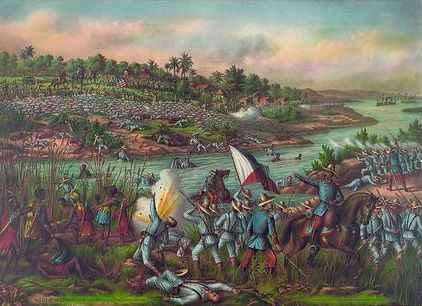
1898 Philippine-American War: The Filipinos, who had fought side by side with the Americans in expectation of independence, rebel against their former allies turned occupiers as 11,000 US ground troops occupy the Philippines. (Brands)
[See: Countdown to Infamy: Timeline to Pearl Harbor.]1900 Boxer Rebellion: Peking relieved by multinational force:
During the Boxer Rebellion, an international force featuring British, Russian, American, Japanese, French, and German troops relieves the Chinese capital of Peking after fighting its way 80 miles from the port of Tientsin. The Chinese nationalists besieging Peking's diplomatic quarter were crushed, and the Boxer Rebellion effectively came to an end. [For further details, Click here.]
1914 World War I: Various:
Battle of Lorraine: A full-scale French offensive begins southeast of Metz. Following a planned withdrawal, the Germans counterattack, throwing the French back to the fortified heights of Nancy.
French generals, when envisioning Plan XVII, believed the weight of a massive assault would trample anything in its path. The general staff believed that a 20-second charge could cover 50 meters before the enemy could shoulder their rifles and try to repel the charge. With enough men, a charge that had already made 50 meters had too much momentum and could not be stopped. Alas, the German machine guns only took about 8 to 10 seconds to lay down a lead curtain of bullets, decimating whole lines of attacking French.
Kaiser Wilhelm II leaves Berlin: He chooses to live near the Western front, or at Pless, in Silesia, for the remainder of the war:
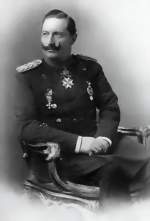
The Kaiser was happiest when he was surrounded by his military and naval entourage whom he valued above everyone else - in fact, he had only contempt for civilians. If Prussia conjures up military imagery to this day, this is at least partly due to Wilhelm II, under whose reign an exaggerated cult of the military was practised. There had been a strong military element to the Prince's upbringing, and he had fancied himself as a second Frederick the Great, his famous ancestor. His surprisingly bellicose nature and aggressive behaviour no doubt stemmed at least in part from the insecurities that his troubled childhood and disability had created in him. He could not wait to accede to the throne when his father died after only 99 days as Kaiser, and even his own mother was frightened of what he might do once he had become the highest decision-maker in Germany. When he became Kaiser he was at the same time supreme commander of the Army and Navy, by right of his Oberste Kommandogewalt (supreme power of command) over Prussia's and Germany's armed forces. It was his prerogative to decide all important appointments in the military as well as civilian sphere -- from the Chief of Staff to the Imperial Chancellor, all office holders were dependent on the Kaiser's patronage. He surrounded himself with all the pomp of the Prussian military, its decorative and ritualistic practices and traditional male-dominated culture. His military entourage gave him both a sense of importance and of belonging. It was with the help of his military friends and advisers that Wilhelm ultimately conducted policy and that some of his most damaging influence on policy-making could be felt.
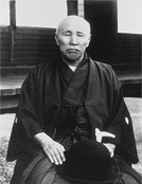
Japan—led by Prime Minister Okuma Shigenobu—delivers an ultimatum demanding that Germany withdraw their warships from Asian waters and transfer control of Tsingtao to Japan. Note: The East Asia Squadron, under the command of Admiral Maximilian von Spee, has already left Tsingtao for the central and eastern Pacific. From there most of von Spee's squadron will get underway for the west coast of South America, where the squadron will eventually be destroyed at the Battle of the Falkland Islands.

1915 World War I: List Regiment: Gefreiter Adolf Hitler's 16 Reserve Infantry Regiment continue to occupy a position at Fromelles—pictured above in a drawing by Hitler—on a level field with water channels, willow trees and willow stalks; in the distance towards the enemy lines lies an insignificant wood with barbed wire entanglements. Under the direction of their defense-minded commander, Lieutenant General Gustav Scanzoni von Lichtenfels, the regiment works ceaselessly day and night to further fortify their position at Fromelles while fighting off repeated assaults by the enemy. [For further details, Click here.]
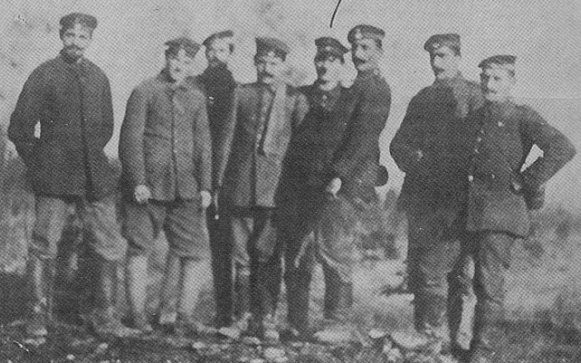
Hitler and his fellow dispatch runners
1916 World War I: List Regiment: Gefreiter Adolf Hitler endures trench warfare in Flanders (Artois) with 3 Company, 16 Reserve Infantry Regiment. [For further details, Click here.]
1917 World War I: Various:
China declares war on Germany and Austria:
When World War I broke out in 1914, Japan fought on the Allied side and seized German holdings in Shandong Province. In 1915 the Japanese set before the warlord government in Beijing the so-called Twenty-One Demands, which would have made China a Japanese protectorate. The Beijing government rejected some of these demands but yielded to the Japanese insistence on keeping the Shandong territory already in its possession. Beijing also recognized Tokyo's authority over southern Manchuria and eastern Inner Mongolia. In 1917, in secret communiques, Britain, France, and Italy assented to the Japanese claim in exchange for Japan's naval action against Germany.
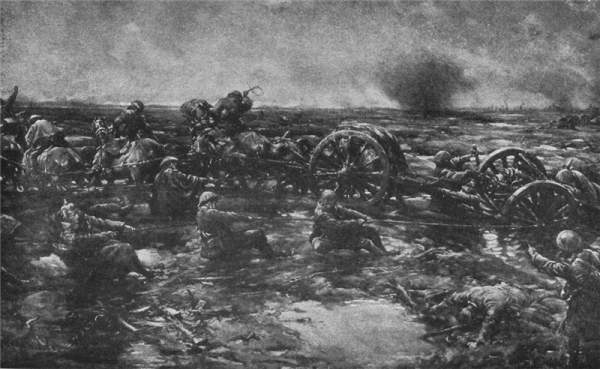
List Regiment (July 22-September 8): Dispatch Runner Gefreiter Adolf Hitler serves at the front with 3 Company, 16 Bavarian Reserve Infantry Regiment during Phase 2 operations in Flanders. Most of their time in the trenches gas masks are worn, while English bombers attack, and tanks—a new terror witnessed for the very first time by most—attempt to advance over a long front through seas of mud. [For further details, Click here.]
1918 World War I: List Regiment (July 20-August 21): Gefreiter Adolf Hitler's 16th RIR continues building a new line of defenses on the site of the failed Second Battle of the Marne. [For further details, Click here.]
1923 Weimar: Stresemann Coalition:
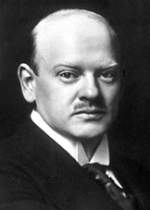
On 13 Aug 1923 Stresemann was appointed Reich Chancellor of the "Great Coalition" government, composed of representatives of the Social Democrats, the Center, the Democrats, and the People's Party. He also assumed the duties of acting foreign minister. In September 1923 Stresemann declared an end to the "passive resistance" policy, initiated by his predecessor, Wilhelm Cuno, but the Social Democrats refused to support Stresemann's policy and left the coalition. The government resigned on 3 Oct 1923, and Reich President Friedrich Ebert again commissioned Stresemann to form his second government. During his second administration, Stresemann faced an attempt to proclaim the Rhineland Republic in Aachen (25 Oct 1923) and the putsch of Adolf Hitler (8-9 Nov 1923) in Munich. The government of Stresemann did not survive a vote of no confidence in the Reichstag on 23 Nov 1923 over the treatment of issues in Bavaria and Saxony. Stresemann was appointed foreign minister (30 Nov 1923 - 3 Oct 1929) in the cabinet of Wilhelm Marx and retained this post in subsequent governments. He secured the acceptance of the Dawes Plan (1924), which restructured reparations on the basis of Germany's ability to pay, and signed the Pact of Locarno (1925). On 8 Sep 1926 Germany was admitted into the League of Nations. Despite his health, which declined rapidly in early 1928, Stresemann retained his position as foreign minister; served as President of the Council of the League of Nations (7 Mar 1927 - 1 Sep 1927); In 1929 at The Hague, he accepted the Young Plan which named 30 Jun 1930, as the final date for the evacuation of the Ruhr. After suffering two strokes, Stresemann died on 3 Oct 1929.
1928 Death: Alfred Henschke, ps. Klabund, German writer, poet: When World War I broke out, he greeted it excitedly and, not unlike many other writers of the time, wrote various patriotic poems. He was not drafted into the military due to the weakness of his lungs and, indeed, in these years he often had to spend time in Swiss sanatoria. Over the course of the war, Klabund's outlook changed and he became an opponent of the war. He even went so far as to publish in 1917 an open letter to Kaiser Wilhelm II in the newspaper Neue Zuercher Zeitung calling for his abdication, as a result of which Klabund was charged with treason and insulting the Kaiser.
1933 Women Against the Persecution of Jews in Germany—a committee of non-Jews—announces its establishment in New York City. (THP)
1935 FDR signs Social Security Act:
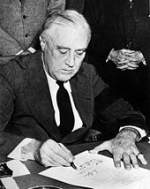
On this day in 1935, President Franklin D. Roosevelt signs into law the Social Security Act. Press photographers snapped pictures as FDR, flanked by ranking members of Congress, signed into law the historic act, which guaranteed an income for the unemployed and retirees. FDR commended Congress for what he considered to be a "patriotic" act. [For further details, Click here.]
1936 Various:
From an address by President Roosevelt:
I have seen two hundred limping exhausted men come out of line-the survivors of a regiment of one thousand that went forward forty-eight hours before. I have seen children starving. I have seen the agony of mothers and wives. I hate war. I have passed unnumbered hours, I shall pass unnumbered hours, thinking and planning how war may be kept from this Nation. I wish I could keep war from all Nations; but that is beyond my power. [For the full text, Click here.]
Britain: Arnold Leese—publisher of The Fascist—a periodical of the Imperial Fascist League, is tried in London on charges of seditious libel against British Jews:
Arnold Leese (1878-1956) was a fanatical anti-Semite who before the war expressed pro-Nazi views (though he moderated these after the German invasion of Norway). Leese had founded the Imperial Fascist League in 1928. He was imprisoned for 6 months in 1936 after being convicted for libelling Jews in the League's monthly paper The Fascist. When named on a detention order issued under the Defence Regulations after the outbreak of the Second World War, he went into hiding, but was eventually detained in November 1940.
Leese was released on conditions in December 1943 because of ill health, but resumed his anti-Jewish activities. He wrote anti-Semitic tracts (most notably The Jewish War of Survival which was privately published in the United States), and was involved in a conspiracy to assist escaping Nazis on the 'wanted list for war criminals' to evade capture and flee to South America, for which he was convicted in 1947.
Poland: Count Jean Szembeck reports that during a recent conversation with Joachim von Ribbentrop that the German Foreign Minister "insisted upon the necessity of Polish-German collaboration." Both Poland and Germany, Ribbentrop said, "are under the threat of a very great danger. Bolshevism plans to destroy all of the fruits of Western civilization."
1939 Various:
New York Congressman Hamilton Fish—president of the US delegation to the Interparliamentary Union Congress conference in Oslo, Norway—meets with Ribbentrop. Fish is a vocal isolationist and staunch opponent of Roosevelt. The congressman advocates better relations with Germany and hopes to solve the Danzig question during the August 15-19 conference in Norway. Ribbentrop tells Fish that Germany has lost its patience and unless Danzig is restored to Germany war will break out.
Ribbentrop served as Foreign Minister of Nazi Germany from 1938 until 1945. Fish flew to Oslo in Ribbentrop's private plane. Fish, a staunch opponent of Roosevelt, advocated better relations with Nazi Germany and hoped to solve the Danzig question during the conference in Norway. Stepping out of Joachim von Ribbentrop's plane in 1939, Fish opined that Germany's claims were just.
Upon his return to the States, Fish used his office to distribute copies of The Protocols of the Elders of Zion. When accused of anti-Semitism, he responded, "It doesn't bother me any. There's been too much Jewism going around anyway."
Chamberlain and Halifax receive details of Ciano's meetings with Hitler and Ribbentrop. They consider the idea of sending a German-speaking Briton to negotiate directly with Hitler.
German Ambassador in the USSR (Schulenburg) to State Secretary, German Foreign Office (Weizsaecker):
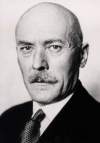
I am still of the opinion that any hasty measure in the matter of our relations with the Soviet Union should be avoided; it will almost always be harmful. So I consider it entirely right that our treatment of the Soviet Embassy in Berlin be relaxed only slowly. The following were the main points in my last conversation with Herr Molotov: the statements about the Baltic States satisfied him to a certain extent, but he wanted to know whether we also included Lithuania among the Baltic States. My statements on the Polish question evidently impressed him, too; he followed my words with the greatest attentiveness. His comment on this point is perhaps worth noting: "Compliance with the desire of the Germans that, in the Polish matter, no 'solution' be forced on the Reich, depends, above all, on Germany itself.
1940 World War II: Various:
Polish pilots: The all-Polish, RAF 302 City of Poznan Fighter Squadron, begins operations in Britain. Note: One out of every eight RAF pilots during the Battle of Britain are Polish.
Bad weather reduces the number of German fighters attacking Britain to 500:
All that stood between the British and defeat was a small force of RAF pilots outnumbered in the air by four to one. Day after day the Germans sent armadas of bombers and fighters over England hoping to lure the RAF into battle and annihilate the defenders. Day after day the RAF scrambled their pilots into the sky to do battle often three, four, or five times a day. Britain's air defense bent but did not break. By September, the Germans lost enthusiasm for the assault. Hitler postponed and then canceled invasion plans, turning his attention to the defeat of Russia. In appreciation of the RAF pilots' heroic effort, Winston Churchill declared: "Never before in human history was so much owed by so many to so few." [For further details, Click here.]
[See: Why Did Hitler Lose The Battle of Britain?]1941 World War II: Various:
Germans occupy Smolensk:
After the Germans captured the city in 1941, they found the intact archives of Smolensk Oblast Committee of the Communist Party, the so-called Smolensk Archive. The archive was moved to Germany, and a significant part of it eventually ended up in the United States, providing Western scholars and intelligence specialists with unique information on the local workings of the Soviet government during its first two decades. The archives were returned to Russia by the United States in 2002.
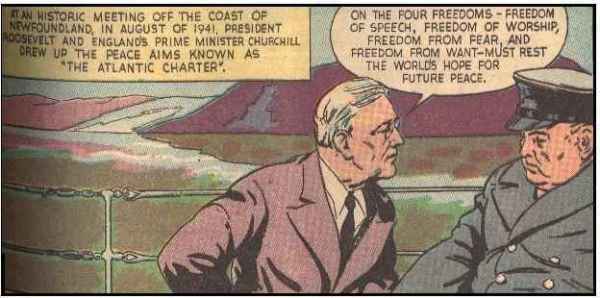
Britain and America issue the ATLANTIC CHARTER, proclaiming the establishment of a "new world order." The following month fifteen anti-Axis governments endorse its provisions. (See September 24, 1941 & January 1, 1942)
Death: Maximilian Kolbe, Polish martyr considered a Saint by Catholics. During World War II, in the Niepokalanow friary, Kolbe provided shelter to 2,000 Jews. He was also active as a radio amateur, with Polish call letters SP3RN, vilifying Nazi activities by reporting the facts. On February 17, 1941, he was arrested by the German Gestapo and imprisoned in the Pawiak prison, and, on May 25, was transferred to Auschwitz I as prisoner #16670. In July 1941, a man from Kolbe's bunker had vanished, prompting Karl Fritzsch, the Lagerfuehrer, to pick 10 men from the same bunker to be starved to death in the notorious torture block, Block 11, in order to deter further escape attempts. (The man who had disappeared was later found drowned in the camp latrine.) One of the selected men, Franciszek Gajowniczek, cried out, lamenting his family, and Kolbe volunteered to take his place. After two weeks of starvation, only four of the ten men were still alive, including Kolbe. The cells were needed, and Kolbe and the other three were executed with an injection of carbolic acid in the heart.
1942 World War II: Various:
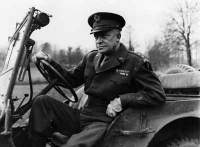
Dwight D. Eisenhower is named the Anglo-American commander for Operation Torch, the invasion of North Africa.
German forces cross the upper Kuban river at Krasnodar in the Caucasus.
1943 Church and Reich: From a letter to General Berard from the President of the French Delegation of the Armistice Commission:
From the beginning of the war, the treasure of Strasbourg Cathedral and the property of certain parishes of this diocese had been entrusted by Monseigneur Ruch, Bishop of Strasbourg, to the Beaux-Arts Department. This department had put them in a safe place in the castles of Hautefort and of Bourdeilles in Dordogne, where they still were on the date of 20 May 1943. The treasure and this property included, in particular, the pontificalia reserved for the exclusive use of the Bishop, several of which were his personal property, the relics of saints, vessels, or objects for the performance of ceremonies. After having sought on several occasions-but in vain-to obtain the consent of Monseigneur Ruch, the Ministerial Counsellor Kraft, on 20 May, requested not only the prefect of Dordogne, but also the director of religious matters, for authority to remove the objects deposited. Faced with the refusal of these high officials, he declared that the repatriation to Alsace of the property of the Catholic Church would be entrusted to the Sicherheitspolizei. As a result, at dawn on 21 May, the castles of Hautefort and Bourdeilles were opened and occupied by troops, despite the protests of the guardian. The sacred objects were placed in trucks and taken to an unknown destination. This seizure, moreover, was extended to consecrated vessels and ceremonial objects and the relics of saints worshipped by the faithful. The seizure of these sacred objects by laymen not legally authorized and the conditions under which the operation was carried out aroused the emotion and unanimous reprobation of the faithful.
1944 World War II: Various:
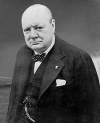
Churchill to Eden: It will cause the Russians much annoyance if the suggestion that the Polish patriots in Warsaw were deserted gets afoot, but they can easily prevent it by operations well within their power. It certainly is very curious that at the moment when the Underground Army has revolted, the Russian Armies should have halted their offensive against Warsaw and withdrawn some distance. For them to send in all the quantities of machine-guns and ammunition required by the Poles for their heroic fight would only involve a flight of 100 miles . . . . But what have the Russians done? I think it would be better if you sent a message to Stalin through Molotov referring to the implications that are afoot in many quarters and requesting that the Russians send all the help they can. This course would be more impersonal than that I should do it through Stalin.
Churchill to FDR: I have had meetings the last two days with Marshal Tito and the Yugoslav Prime Minister . . . . The two leaders reached a satisfactory agreement on a number of practical questions. They agreed that all Yugoslav naval forces will now be united in the struggle under a common flag. This agreement . . . will enable us with more confidence to increase our supplies of war material to the Yugoslav forces . . . . I am informing Marshal Stalin of the result of these meetings.
USA: The Federal Government allows the manufacture of certain domestic appliances to resume on a limited basis.
1945 WW2: Various:
Japan's surrender made public:
On this day in 1945, an official announcement of Japan's unconditional surrender to the Allies is made public to the Japanese people.
Even though Japan's War Council, urged by Emperor Hirohito, had already submitted a formal declaration of surrender to the Allies, via ambassadors, on August 10, fighting continued between the Japanese and the Soviets in Manchuria and between the Japanese and the United States in the South Pacific. In fact, two days after the Council agreed to surrender, a Japanese submarine sank the Oak Hill, an American landing ship, and the Thomas F. Nickel, an American destroyer, both east of Okinawa.
In the afternoon of August 14, Japanese radio announced that an Imperial Proclamation was soon to be made, accepting the terms of unconditional surrender drawn up at the Potsdam Conference. That proclamation had already been recorded by the emperor. The news did not go over well, as more than 1,000 Japanese soldiers stormed the Imperial Palace in an attempt to find the proclamation and prevent its being transmitted to the Allies. Soldiers still loyal to Emperor Hirohito repulsed the attackers.
That evening, General Anami, the member of the War Council most adamant against surrender, committed suicide. His reason: to atone for the Japanese army's defeat, and to be spared having to hear his emperor speak the words of surrender. (History.com)

V-J Day: US President Harry Truman announces that Japan has surrendered to the Allies. After the Soviet attack and two atomic bombs, Japan surrenders unconditionally to the Allied forces.
1946 Death: Robert Wagner: Reichswehr officer who participated in Hitler's Munich putsch. One of Hitler's earliest supporters, he served as party provincial boss of Baden, 1925-1945. In 1940, he became chief of the civilian administration in Alsace, a position he held until the end of the war. Sentenced to death by a French military court; he is executed at Strasbourg.
1946 Nuremberg Tribunal: SA leader Max Juettner gives testimony:
On the Church question, the SA left the individual complete freedom of choice. Staff Chief Roehm was a Church member. Moreover, I recall that in 1934 he issued an order to the SA in which he prohibited SA men from taking sides in any Church controversies, for the reason that this might possibly disturb the solidarity of the SA. I personally was always a member of the Protestant Church and still am a member today. As deputy of the Chief of Staff I was a Church member also. The great majority of the SA men were Church members. Many members of the SA--in any case not merely isolated members--were active in Church councils even up to the end, a fact well known to us, which we never tried to prevent.
[For the full text of today's proceedings, Click here.]1949 Various:
West Germany: Citizens vote for the first time since the end of the war, after a 're-education' program creates proper conditions for the vote. Konrad Adenauer becomes the first chancellor of the Federal Republic of Germany.

Rocketry: Major General Holger Toftoy, head of the Army's rocket development program, begins negotiations to purchase the Redstone Arsenal in Huntsville, Alabama, in order to develop it into a rocket development facility. His efforts will ultimately be successful, and by November of 1950 all of the 130 German scientists on von Braun's team will join 500 military personnel, 120 civilian government workers and several hundred employees of GE at Redstone. Von Braun will become the Technical Director, Guided Missile Development Group, which is basically the same position he held at Peenemuende. (Piszkiewicz)
[See: Wunderwaffen: Hitler's Deception and the History of Rocketry.]
1958 Death: Konstantin von Neurath: German diplomat, Foreign Minister of Germany (1932-1938) and Reichsprotektor (Governor) of Protectorate of Bohemia and Moravia (1939-1941).
Von Neurath: I have never been anti-Semitic. My Christian and humanitarian convictions prevented that. A repression of the undue Jewish influence in all spheres of public and cultural life, as it had developed after the first World War in Germany, however, I regarded as desirable.
1962 Spandau Prison: From Spandau: The Secret Diaries, by Albert Speer:
Months ago Hess had a violent disagreement with the British dentist. The dentist wanted to pull his last six teeth, since it is too much trouble to make new partials and bridges every time another tooth is lost. This prompted Hess to appeal to the directors in a petition. He succeeded in obtaining a ruling that no operation on any part of a prisoner's body may be performed without the prisoner's written consent. After the French dentist had also decided that all the teeth must be pulled, a young female Soviet dentist examined Hess's mouth. Her verdict: "Those teeth must come out."
At this point Hess demanded that an American dentist be consulted. Accompanied by three assistants, the American dentist turned up in the infirmary yesterday with a portable x-ray apparatus. He finally determined that the six teeth were sound, and declared: "My principle is to make extractions only when necessary." Now this man is in charge of our dental work. Hess has won. Today he reveled in his victory and declared proudly, "One dentist for every one and a half teeth!" (Speer II)
Edited by Levi Bookin (Copy editor)
levi.bookin@gmail.com



Click to join 3rdReichStudies



Disclaimer: This site includes diverse and controversial materials--such as excerpts from the writings of racists and anti-Semites--so that its readers can learn the nature and extent of hate and anti-Semitic discourse. It is our sincere belief that only the informed citizen can prevail over the ignorance of Racialist "thought." Far from approving these writings, this site condemns racism in all of its forms and manifestations.
Fair Use Notice: This site may contain copyrighted material the use of which has not always been specifically authorized by the copyright owner. We are making such material available in our efforts to advance understanding of historical, political, human rights, economic, democracy, scientific, environmental, and social justice issues, etc. We believe this constitutes a "fair use" of any such copyrighted material as provided for in section 107 of the US Copyright Law. In accordance with Title 17 U.S.C. Section 107, the material on this site is distributed without profit to those who have expressed a prior interest in receiving the included information for research and educational purposes. If you wish to use copyrighted material from this site for purposes of your own that go beyond 'fair use', you must obtain permission from the copyright owner.
Please Note: The list-owner and moderators of 3rdReichStudies are not responsible for, and do not necessarily approve of, the random ads placed on our pages by our web server. They are, unfortunately, the price one pays for a 'free' website.